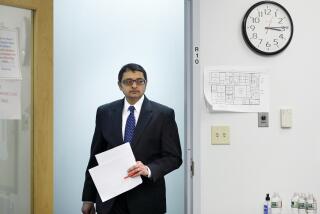AIDS Data to Serve Many Purposes
The expanded federal Centers for Disease Control surveys are only one of the many ways in which the U.S. Public Health Service is planning to gather new AIDS-related data.
The new data will have many uses. It will provide guidance to policy makers and detect changes in public attitudes and knowledge about the deadly disease. They will also be used to assess the effect of the federal government’s “America Responds to AIDS” education campaign.
Most of the additional data is being gathered by the National Center for Health Statistics in Hyattsville, Md. This little-known agency collects health data ranging from birth, marriage and death statistics to prescription drug use, doctor visits and nursing homes.
Wide Range of Topics
The center began to collect AIDS data in August by adding a 15-minute series of questions about the disease to the National Health Interview Survey. In this survey, a random sample of between 800 and 1,000 adults are asked in person each week about a wide range of health topics.
The Health Interview Survey may have substantial advantages over other AIDS public opinion polls, according to Ronald W. Wilson, the director of the center’s division of epidemiology and health promotion. This is because the survey has a response rate of about 90%. By comparison, most telephone opinion polls have response rates of only 50% to 70%.
Next year, the National Center for Health Statistics plans to go into the field with three additional surveys that will also collect AIDS data.
One survey is the National Health and Nutrition Examination Survey, which includes extensive physical exams and blood tests on 45,000 Americans that take six years to complete. The exams are conducted in tractor-trailers that crisscross the country and serve as mobile exam centers.
One of the blood tests “under serious consideration” is an anonymous test for acquired immune deficiency syndrome antibodies, according to Wilson. But he said there are concerns that even anonymous AIDS testing “may have an impact” on the overall accuracy of the $100-million survey because some people may refuse to participate as a result.
Another survey, the National Survey of Family Growth, will involve a random sample of 8,000 women age 15 to 44. The respondents will receive “very detailed and very personal” in-person interviews, including questions about their sexual and contraceptive practices and AIDS-related risk factors, Wilson said.
The third, the National Maternal and Infant Health Survey, will collect detailed data from mothers, physicians and hospitals on a random sample of 10,000 live births, 4,000 fetal deaths and 6,000 infant deaths. Physicians and hospitals will be asked about the results of any AIDS antibodies tests that were performed.
More to Read
Sign up for Essential California
The most important California stories and recommendations in your inbox every morning.
You may occasionally receive promotional content from the Los Angeles Times.









